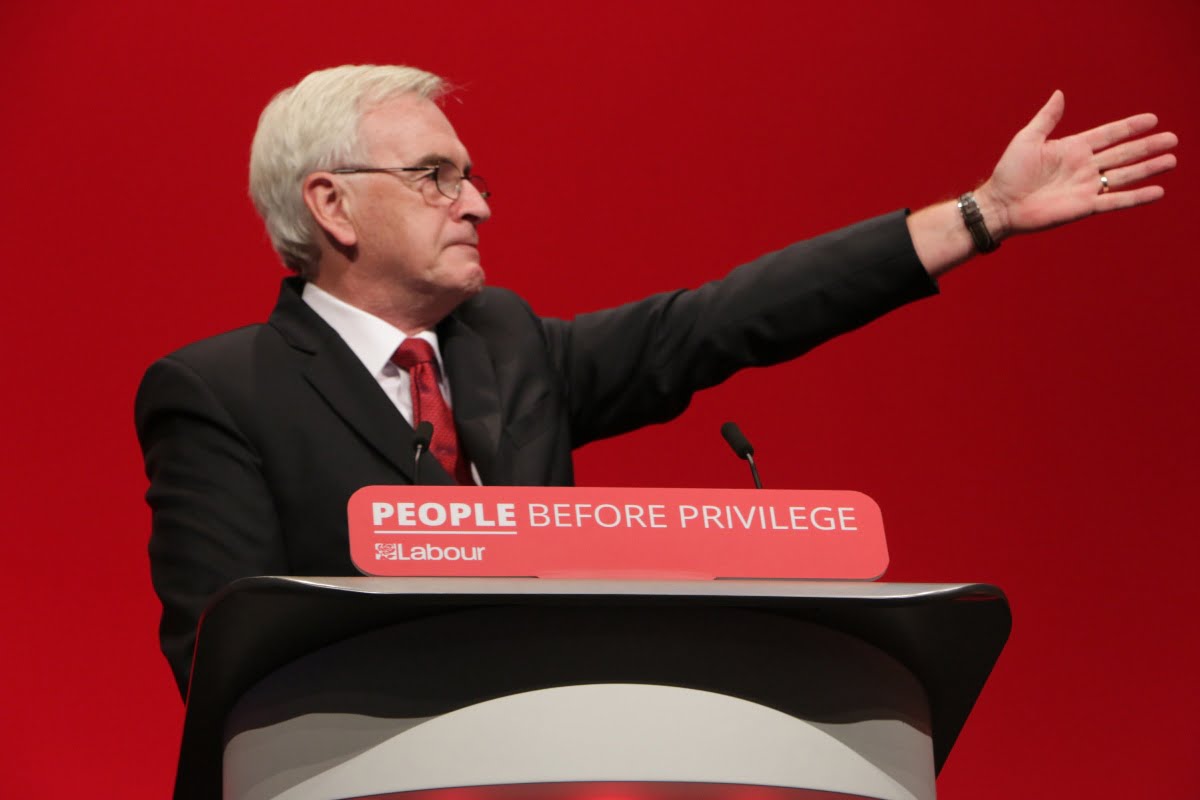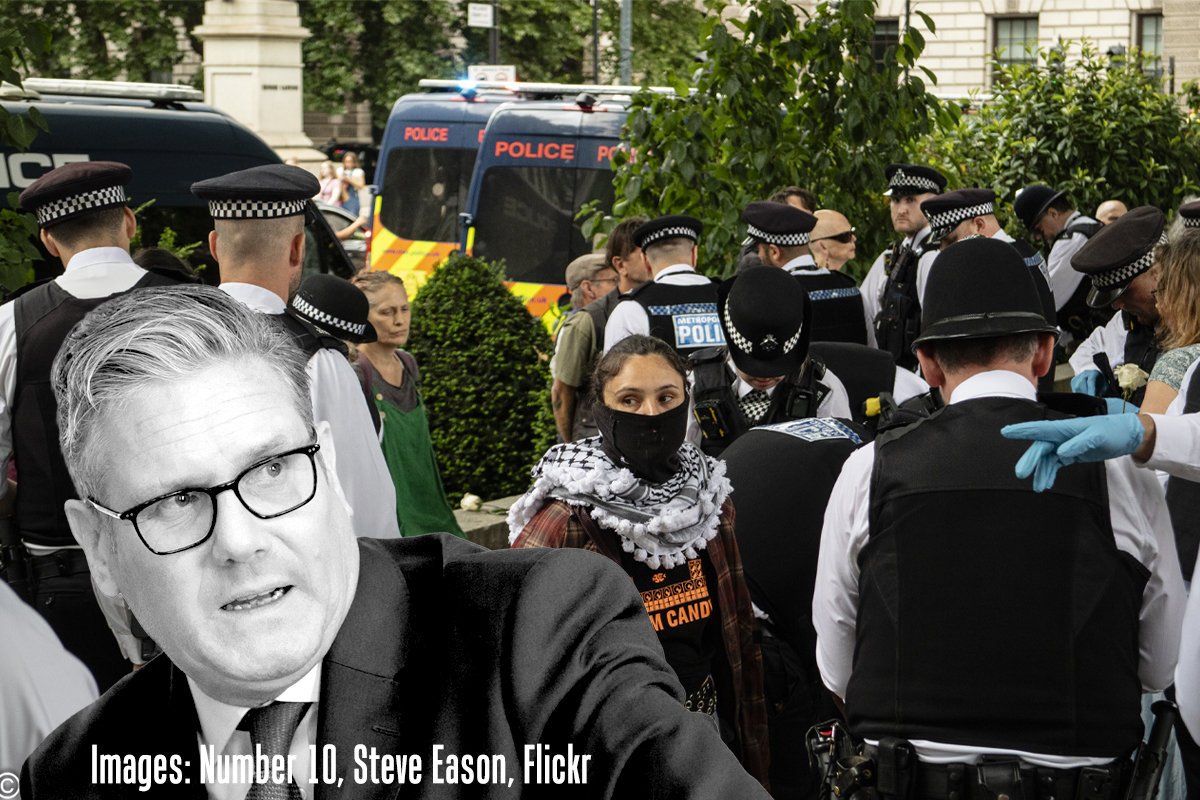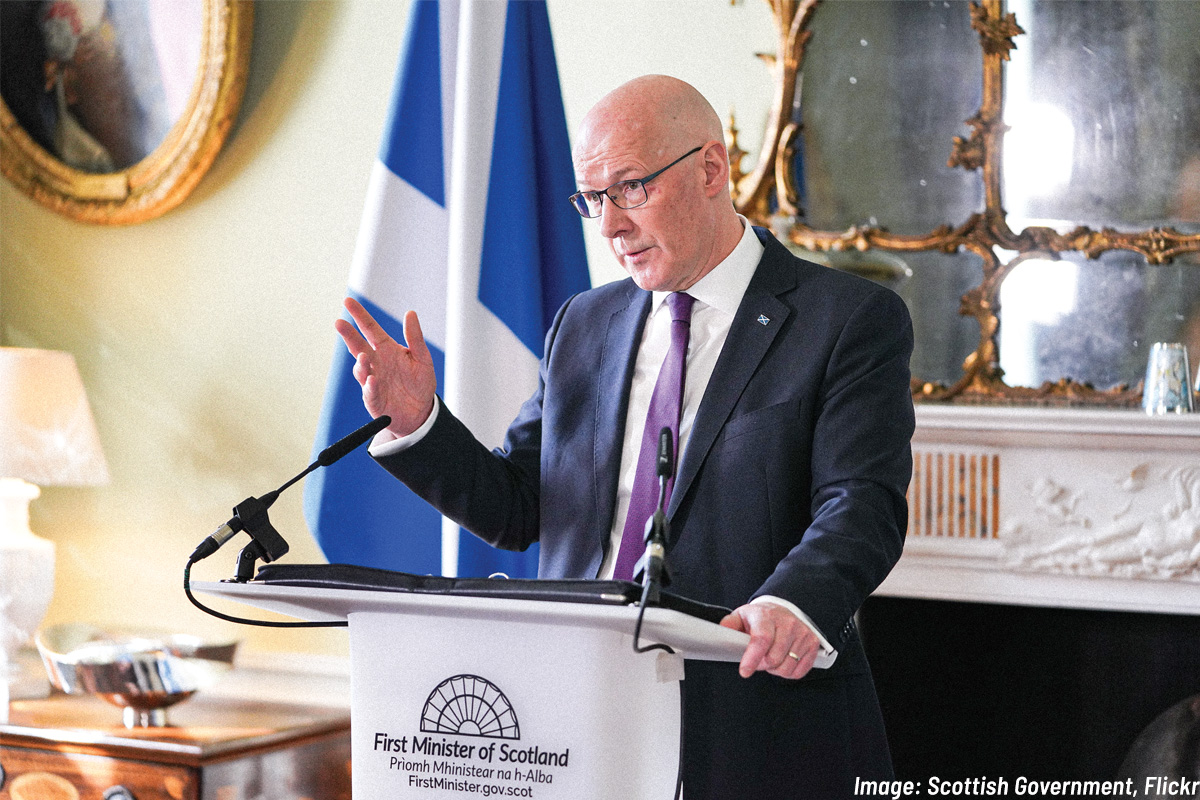John McDonnell yesterday outlined the key tasks facing a Labour government in its opening weeks. But the response from big business highlights the threats facing such a government too. Labour must fight back with bold socialist measures.
The most important election of a generation is almost upon us. Boris Johnson, the Tories, and their friends in the capitalist press are doing their best to thwart Corbyn’s chances of making it into Number 10. But with a mass movement taking to the streets and onto social media, everything is up for grabs.
Whilst securing a Labour victory is clearly the focus, many in the Corbyn movement are already thinking beyond polling day, discussing the challenges that a left Labour government will face once in power.
It was this key question that shadow chancellor John McDonnell addressed yesterday, in a speech about the main priorities for the first 100 days of a Labour government.
McDonnell’s announcements add flesh to the bones of an already-radical manifesto of bold policies. In his speech, the shadow chancellor confirmed that Labour will take immediate action to end austerity, bring key utilities into public ownership, and begin a ‘Green Industrial Revolution’.
“When Labour puts money in your pockets,” the left-wing Labour MP stated, “we’ll also put power back in your hands.”
Such promises are exactly what is needed to spur on activists and add another gust of wind into the sails of the formidable Corbyn movement for the final days of campaigning.
But whilst these pledges have enthused workers and youth, they have also prompted a vocal backlash from the very billionaires targeted by Labour’s programme. This strident opposition from the bosses and bankers is a harbinger of the threats that will face a future Corbyn government.
Promises
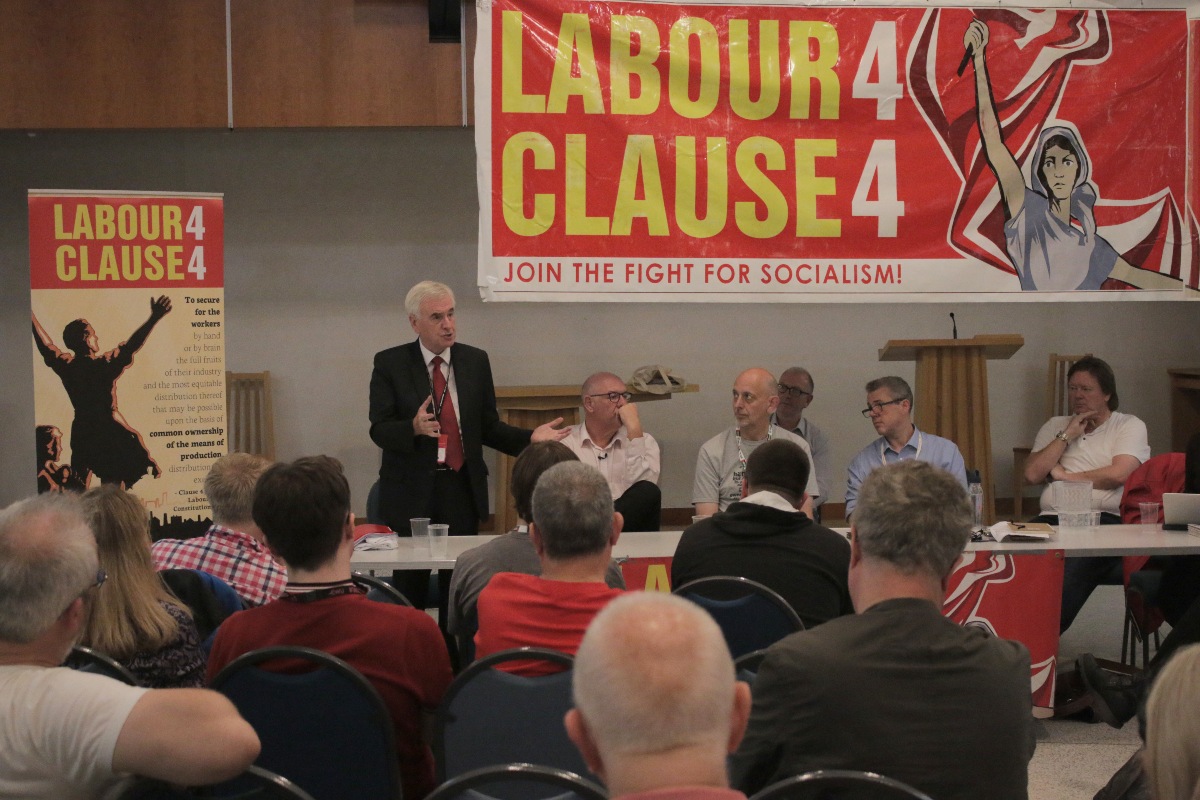 In yesterday’s speech, McDonnell asserted that Labour will waste no time in implementing the manifesto’s commitments. These include providing billions extra for the NHS; bringing in a £10 per hour living wage; and offering a 5% pay rise for public sector workers after years of pay freezes. All of this would be outlined in a Budget presented before Parliament on 5 February 2020, McDonnell stated.
In yesterday’s speech, McDonnell asserted that Labour will waste no time in implementing the manifesto’s commitments. These include providing billions extra for the NHS; bringing in a £10 per hour living wage; and offering a 5% pay rise for public sector workers after years of pay freezes. All of this would be outlined in a Budget presented before Parliament on 5 February 2020, McDonnell stated.
On top of that, the shadow chancellor confirmed that he has “draft plans to hand to the civil servants on Friday”, in the event of a Labour win. These include blueprints for a whole new array of institutions, such as a ‘National Transformation Unit’ tasked with coming up with a decade-long strategy of public investment; and a ‘National Investment Bank’ to channel money into where it is needed most: from renewable energy to large-scale infrastructure.
“Our Green Industrial Revolution will deliver the changes we need to avert climate catastrophe,” McDonnell assured. “And it will put British industry back on the map, bringing prosperity to every part of our country. It will give every community something to be proud of.”
Most notable, however, was McDonnell’s announcement regarding Labour’s nationalisation plans. Putting key parts of the economy into the hands of the working class is one of Labour’s priorities upon taking charge of the Treasury, he affirmed.
“When we win power it will be to give it to you,” McDonnell informed the assembled audience. “Labour will put real power in your hands every day. Together we will improve services and bring down fares and bills because we believe in democracy and we believe in you.”
McDonnell even outlined how these industries would be democratically controlled. As part of efforts to bring water, energy, and rail into public ownership, he stated that Labour would “set up boards to run them, made up of you, the customer, and you, the worker, as well as representatives from local councils, metro mayors and others.”
This would be in addition to “People’s Assemblies to hold these boards to account and give everyone the option of participating in how their utilities are run.”
All of this is extremely positive stuff that, if implemented, would go a long way to provide the “irreversible transfer of wealth and power” that Corbyn and McDonnell have promised – taking ownership and control out of the hands of a parasitic rich elite, and putting it into the hands of the working class.
Warnings
But the response from the current economic owners offers a word of warning of the dangers that lie ahead for Labour’s first 100 days – and beyond.
Responding to McDonnell’s speech, billionaire founder of Phones 4U John Caudwell stated that Labour’s economic policies “frighten me to death”.
“When I hear words like, or phrases like, ‘nobody deserves to be a billionaire’ and phrases like ‘we’re going to tax high technology companies’, it frightens the living daylights out of me,” the telecoms tycoon screeched.
In a face-to-face meeting between the two, Caudwell spoke on behalf of the capitalist class in asserting that “nearly every wealthy person I know is thinking of leaving the UK, including me, if Labour get in.”
These are not idle threats. As we have reported elsewhere, the super-rich have already begun to protect their assets against a Corbyn government. And private owners of industries earmarked for nationalisation – such as broadband providers – are warning of a “wave of unprecedented litigation” against “a blatant breach of human rights” (read: property rights) if a Labour government does not provide market-level compensation.
The aim of these statements is clear: this is outright blackmail from the bosses, bankers, and billionaires. These fat cats will never accept a left Labour government that wants to make the rich pay, or that promises to transfer wealth and power to the working class. They will deploy all manner of smears, slanders, and sabotage in order to bring such a government down.
Sabotage
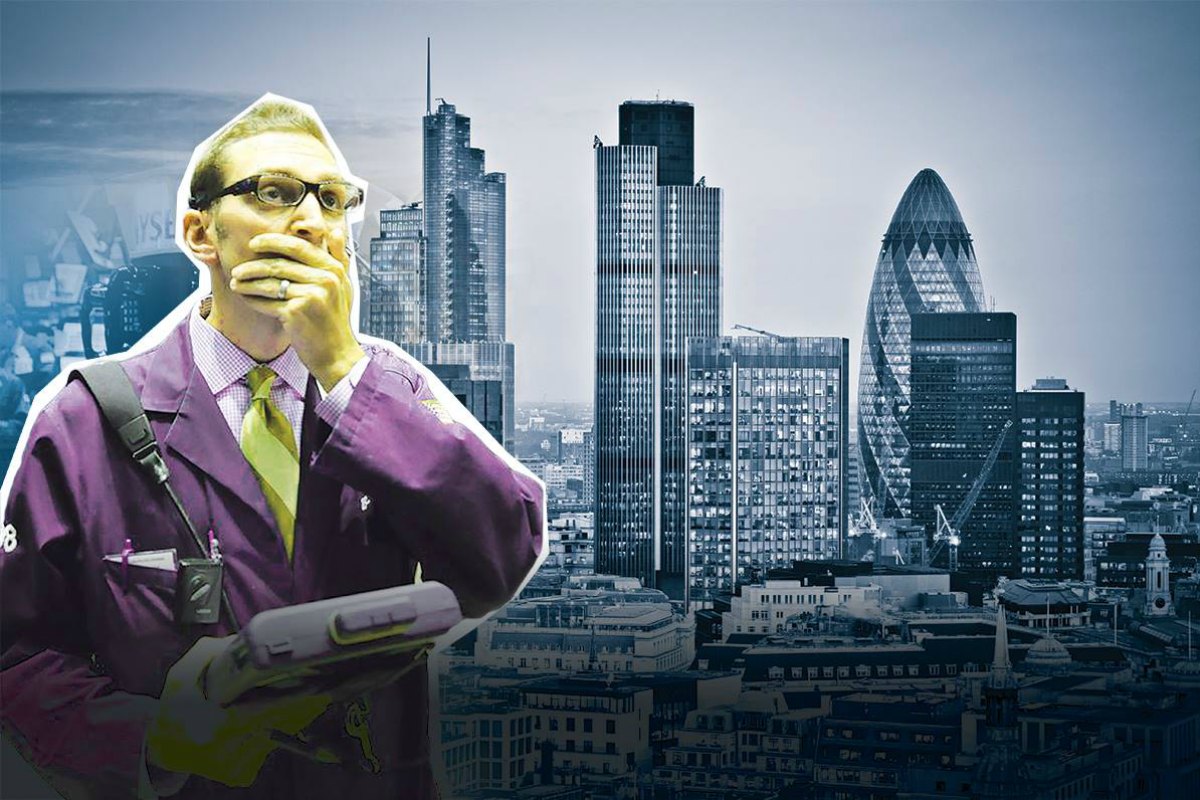 John McDonnell attempted to assuage Caudwell’s fears, stating that Labour’s plans had been “exaggerated”. “I’ve actually said I do pay tribute to those people, the entrepreneurs, who create the wealth,” the shadow chancellor reassured.
John McDonnell attempted to assuage Caudwell’s fears, stating that Labour’s plans had been “exaggerated”. “I’ve actually said I do pay tribute to those people, the entrepreneurs, who create the wealth,” the shadow chancellor reassured.
But no amount of soothing words will ever placate the CEOs and the City. Indeed, McDonnell was correct to talk over the heads of these ladies and gentlemen in addressing Labour supporters directly yesterday.
“There will always be those at the top who will do anything to stop us. We’ve seen character assassinations, lies and smears taken to a new level,” McDonnell rightly asserted in his ‘first 100 days’ speech.
“Those who’ve had it good for so long are terrified. Terrified of losing control. When they attack me, or Jeremy, we know it’s not really about us. It’s about you. They hate the people of this country. They hate the idea you might dream of a better life. No wonder they will stop at nothing to keep you from taking control of the country where you live.”
This hits the nail on the head. The capitalists will stop at nothing to prevent a Corbyn government carrying out its radical manifesto, which threatens the privileges, profits, and power of the wealthy elite. In the face of such sabotage, the only forward is to take bold measures. As they say in the sporting world: the best defence is offence.
Power
 Labour’s first 100 days in power must therefore go even further than what has already been promised. What is required is not slow, steady, gradual nationalisation, but immediate nationalisation without any compensation.
Labour’s first 100 days in power must therefore go even further than what has already been promised. What is required is not slow, steady, gradual nationalisation, but immediate nationalisation without any compensation.
The real question is not how much compensation we should be providing the former owners, but how much they should be compensating us! These parasites have been lining their pockets for decades by jacking up prices whilst running services into the ground. Privatisation, outsourcing, and the so-called ‘efficient market’ have been an unmitigated disaster for workers.
Nationalisation must include not just the utilities, but all the key levers of the economy: the ‘commanding heights’ – including the banks, land, construction companies, large property management firms, infrastructure, and major industrial monopolies.
And “real power”, as McDonnell states, must be put in the hands of the working class, by ensuring that nationalised industries are run and managed by workers’ representatives from the government, the trade unions, and the workplaces themselves.
This nationalisation could be carried out by a Labour government on the basis of an Enabling Act, in order to see through the sweeping changes required to urgently address climate change and end the housing crisis.
Above all, we need a socialist plan of production, with an economy based on needs, not profits. Only in this way can we implement the “real change” that Labour is promising in this election. Only in this way can we “secure for workers the full fruits of their industry”, as pledged in the original socialist Clause IV. Only in this way can we build a better society, for the many not the few.

